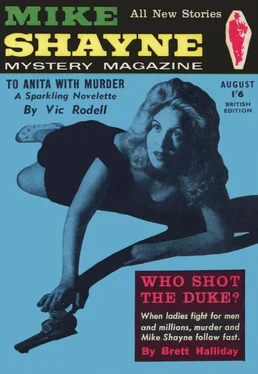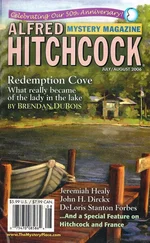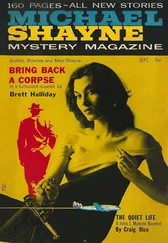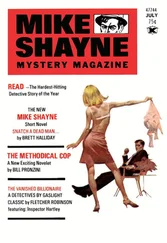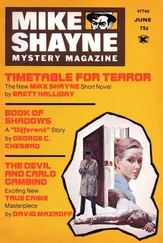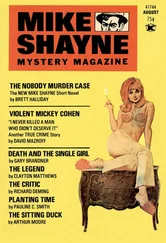Jay Carroll - Mike Shayne Mystery Magazine, Vol. 1, No. 4, August 1957 (British Edition)
Здесь есть возможность читать онлайн «Jay Carroll - Mike Shayne Mystery Magazine, Vol. 1, No. 4, August 1957 (British Edition)» весь текст электронной книги совершенно бесплатно (целиком полную версию без сокращений). В некоторых случаях можно слушать аудио, скачать через торрент в формате fb2 и присутствует краткое содержание. Город: Sydney (London), Год выпуска: 1957, Издательство: Frew Publications (distributed by Atlas Publishing & Distributing), Жанр: Детектив, на английском языке. Описание произведения, (предисловие) а так же отзывы посетителей доступны на портале библиотеки ЛибКат.
- Название:Mike Shayne Mystery Magazine, Vol. 1, No. 4, August 1957 (British Edition)
- Автор:
- Издательство:Frew Publications (distributed by Atlas Publishing & Distributing)
- Жанр:
- Год:1957
- Город:Sydney (London)
- ISBN:нет данных
- Рейтинг книги:3 / 5. Голосов: 1
-
Избранное:Добавить в избранное
- Отзывы:
-
Ваша оценка:
- 60
- 1
- 2
- 3
- 4
- 5
Mike Shayne Mystery Magazine, Vol. 1, No. 4, August 1957 (British Edition): краткое содержание, описание и аннотация
Предлагаем к чтению аннотацию, описание, краткое содержание или предисловие (зависит от того, что написал сам автор книги «Mike Shayne Mystery Magazine, Vol. 1, No. 4, August 1957 (British Edition)»). Если вы не нашли необходимую информацию о книге — напишите в комментариях, мы постараемся отыскать её.
Mike Shayne Mystery Magazine, Vol. 1, No. 4, August 1957 (British Edition) — читать онлайн бесплатно полную книгу (весь текст) целиком
Ниже представлен текст книги, разбитый по страницам. Система сохранения места последней прочитанной страницы, позволяет с удобством читать онлайн бесплатно книгу «Mike Shayne Mystery Magazine, Vol. 1, No. 4, August 1957 (British Edition)», без необходимости каждый раз заново искать на чём Вы остановились. Поставьте закладку, и сможете в любой момент перейти на страницу, на которой закончили чтение.
Интервал:
Закладка:
Once he had accomplished the enormous thing, he ceased to worry or even think about it — perhaps the secret of his considerable success — and, turning his back on chaos, gave himself over to the service of his beloved.
He found the place easily, took the elevator upstairs and went down the narrow corridor to her room. He stood there for a long moment, lost in emerald mists of reminiscence and shocking-pink clouds of anticipation, then removed his hat and turned the knob. He clicked the lock as he closed the door behind him and stood, smiling fatuously into the sweet disorder of her parting from this chrysalis.
Much of the furniture was gone, and the pieces that were left were all tagged — for the Salvation Army, for the superintendent, for one or two persons whose names he didn’t recognise. In one corner of the room was a tumbled clutter of miscellany — a scratched tabouret, some pictures with broken frames, a four-foot model of an Eskimo kayak, a mound of books, papers and magazines, dusty curtains, drapes and slip-covers. Tacked to the north wall, strung around the tabouret and tacked again to the west wall, was a piece of twine, forming a sort of fence around this particular jetsam. Hanging from it was a piece of paper folded in half. On the paper, lettered legibly and tersely, were the words THROW OUT.
Piled just inside the door were the things she wanted to keep, from all her past, to take into her life with him. There were the old typewriter and a mahogany case — the heirlooms. On the top of the case sat a cardboard box, the kind in which one buys a ream of bond paper. It was lettered WIP, which he properly translated as WORK IN PROGRESS.
On this lay the heavy gold-and-leather frame in which he had enshrined his picture. All my love, Lance, and, eclipsing this, was a folded sheet of paper. He picked it up. It read, Lance, I do love you so, Ellie.
Although it was hardly inspired copy, it stopped his heart for a giddy moment. Anyone else might read those words as just those words — he heard them in her eager half-whisper.
He was delicately fanned by her long lashes as they swept up on do and down on so. He knew her special fragrance and even, for a moment, sensed a sort of nearness which was not heat nor odour nor sound, but just — nearness. He let his breath whistle through his nostrils and stood there, shaking his head and murmuring her name.
He opened his eyes on the dangling sign which said, so pitilessly, THROW OUT, and for the very first time felt a small curl of regret. She had so submissively agreed to his half-playful dictum to wipe out the past, that he had never thought of what it might cost her.
He crossed to the twine barrier and ran his gaze over the clutter behind it. He suddenly bent and took up another bond-paper box, also with WIP inscribed upon it. It was dusty and cracked, and written across one corner was Furilla’s Rose.
Here, he thought, were the work-sheets, the carbons, the notes — all the mysterious machine-filings and mould-castings from which a great novel comes — filings and castings Eloise had lived with, slaved over, hoped and dreamed upon — her second novel. Now, because of his arbitrary whim, they were tossed on a heap with a broken kayak and some dusty drapes, under a sign which commanded THROW OUT.
His passion for her mounted the shoulders of his strange reverence for books, a reverence sometimes encountered in the non-reader, and rose towering over him. He took the box over to the stenographer’s chair pushed against the window, sat down with it on his lap, opened it, read—
Furilla threw back the drapes and let in a gush of dawn, a very shout of ruddy gold. Then, standing before the tall pier-glass, she flung away her robe and made another daybreak, another rosier morning in the room.
Yes, it was the famous opening of Furilla’s Rose. How strange it looked in typescript, in grey-haloed carbon! What currents, what depths flowed and swirled in his kitten-princess!
He leafed on.
“Bitch!” Kane shouted hoarsely. “You... you bitch!” His red-rimmed eyes swung close as he bent over her, sitting cool and poised. “Say something, damn you! Can’t you hear me?”
“Yes, thank you,” said Furilla quietly, “I’ll have a crumpet.” She smiled up into his purple, baffled face and added, “Yes, I hear you. The last thing I heard, the last thing a lady could hear, was when you offered me a crumpet.”
That’s my Ellie! thought Lance deMarcopolo fondly. It, it was ugly; she didn’t know it was there until it went away.
He skimmed on, through the tremendous sequence where Furilla met Maserac and went to live in his house. Maserac was an Older Man, and poor Furilla was quite sure that Older Men were safe.
“I’m a very lonely man,” said Maserac, “and to have you in my big old house would be like having the sun shining in all the windows at once.”
“Oh, you mustn’t be lonely! I’ll come, I’ll do everything for you.”
He tilted her heart-shaped face up with his strong old hand and looked piercingly down into her eyes. “Ah, Furilla — do you know what... everything ... might mean?”
“Yes, oh yes!” she cried. “You never had a little daughter. I’ll be your very own dear little daughter!”
Maserac’s hand fell away. “I’m ashamed,” he whispered, “so ashamed!”
That was a close one, thought deMarcopolo admiringly. He turned the leaf over, and a blue slip fell out. He bent and picked it up. It was from a desk memo pad and was imprinted with Office of the Publisher. He didn’t mean to read it, but he couldn’t help it.
It’ll be just like having the sun shining in all the windows at once .
I’ll have a cab in front of your place at seven.
Your own,
Brill.DeMarcopolo sat staring at the paper, holding it between thumb and forefinger, flapping it like a small, blue wing. Brill... Brill? Oh! Brill MacIver! That old fool — the publisher who...
He shook himself, or shuddered, then set the box down on the floor. He got up and took off his topcoat and draped it over the back of the chair, then sat down again. He put the box back on his lap. He didn’t skim it lightly now, though he didn’t know why. He went rapidly through the sheets.
He got to that scene between Furilla and young Harald. Harald had come into Furilla’s life “like a great storm” and, in a famous sequence, there had been a storm — a beaut. It built and built outside, glaring and crashing, silhouetting Harald against its lightning flashes as he climbed in her window. It built and built still more as he pressed closer and closer to Furilla, until, when he reached her, the clouds rolled and the thunder banged and, at last — zing! — a mighty flash burned down the boathouse.
Just here, a paper-clip separated some pages from the main manuscript. It was the scene when, next morning, Furilla awoke, alone, bruised, strangely disturbed, and considered what she was to do.
She rose, trembling, and ran to the mirror. A dream, a dream — surely it was a wonderful, terrible dream! But no — there in the smooth hollow between shoulder and neck, lay the mark of the beast. “Oh!” she cried, herself to her heart. “Oh wonderful, wonderful beast!
“Maserac!” she screamed.
The sound of her own voice frightened her. She cast about wildly, like a frightened animal, then ran to the wardrobe and threw on the lame hostess gown. When the old man opened the door, she stood like a pillar of gold, her hair, her eyes aflame.
“Maserac, Maserac, he loves me!” she sang.
And she told him, told him all of it, each syllable bringing her closer to the joy she knew he would feel for her, for her love, for the life she had begun with Harald. And, when she had finished, she ran to him, held his shoulders. “Maserac, isn’t it wonderful?”
Читать дальшеИнтервал:
Закладка:
Похожие книги на «Mike Shayne Mystery Magazine, Vol. 1, No. 4, August 1957 (British Edition)»
Представляем Вашему вниманию похожие книги на «Mike Shayne Mystery Magazine, Vol. 1, No. 4, August 1957 (British Edition)» списком для выбора. Мы отобрали схожую по названию и смыслу литературу в надежде предоставить читателям больше вариантов отыскать новые, интересные, ещё непрочитанные произведения.
Обсуждение, отзывы о книге «Mike Shayne Mystery Magazine, Vol. 1, No. 4, August 1957 (British Edition)» и просто собственные мнения читателей. Оставьте ваши комментарии, напишите, что Вы думаете о произведении, его смысле или главных героях. Укажите что конкретно понравилось, а что нет, и почему Вы так считаете.
